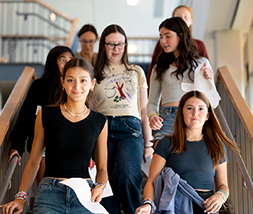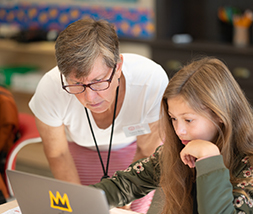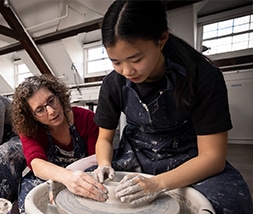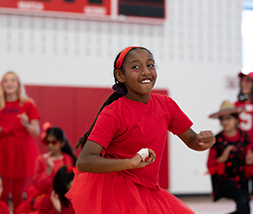Spotlighting Transformation
Head of School Sarah Pelmas
I have never been much of an actor. When I was in high school, the one play in which I was cast had me as part of the Greek chorus, wearing a toga and exclaiming tragically from atop a box painted black, while the lead actors battled fate. Ultimately, several characters were killed. It ended in darkness.
What a contrast with the beautiful and uplifting Class I musical this January, Why the Sky Is Far Away, which featured an original script by Jeremy Johnson, based on a Nigerian tale, original score by Andrew Marshall, gorgeous costumes by Sylvi Re, lights and set designed by Andres Puigbo, and clever dance routines by Annie Ciaraldi. All 32 Class I students, ready or not, were on stage performing—being pushed out of their comfort zones and developing new talents. Even more, the Upper School students were on their feet, clapping and cheering, so proud of their younger sisters.
Just a few weeks later, we were in the black box theater watching the world premiere of Class VII’s Mina Feldman’s play, Course Correction, a murder mystery produced and acted entirely by students. It was funny, intense, well acted and staged, and it drew an audience of folks from as far away as New York and Florida. A true world premiere!
This year alone, there have been six theater productions involving Winsor students, here on campus or at one of our two brother schools, with five more to go this spring! The annual Class IV Shakespeare play (coming up in May) dates back over 100 years, and is one of our most beloved traditions. Almost all alumnae recall their play, and their role, typically with fondness and nostalgia. These days, our Performing Arts faculty create two versions—one set in the Renaissance and the other in a more modern time period. Every student acts in one version and then helps to create the music, the sets, or the costumes for the other. Every student learns the onstage and back-of-the-house aspects of theater and—as I saw last year when student-actors danced and fell down stairs and hid behind plants and hammed it up for the audience while other students played original music, managed the set, or ran the lights—they develop talents they never believed they could have.
Of course, not every student comes to the stage with dreams of occupying the spotlight, and some no doubt find the prospect of performing in front of others quite daunting. But built into Winsor’s environment is the space for girls to explore and try new things—to embrace the discomfort we must experience to foster personal growth, resilience, and self-confidence. And the transformative potential for each of our students as they stretch their boundaries is consistently bolstered by the enthusiastic support they receive from their peers and teachers.
Those of you who have been at Winsor performances know that I tend to cry during them, even at the most comedic or joyful moments. There is something truly miraculous about seeing students perform on stage—you can get a glimpse of who they will be when they command a huge room at a conference or presentation, when they stand up for something that matters to them, or simply make their first announcement in assembly. In our theater productions, students have learned stage fighting, managed intimate scenes, done physical comedy, improvised when lines are dropped, heard their own voices within the ensemble, and realized that “the show must go on.”
Groups become so close they can finish each other’s sentences; they learn to trust that they can risk things, grow, forgive, and love each other without fear. Being someone else on stage is remarkably vulnerable and authentic at the same time, and an opportunity that we offer to every student, many times throughout their years here. When I see them onstage, I know that they are very much themselves, and also more than themselves. These are poignant moments, gifts given to the entire community and cherished in return.





